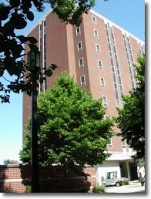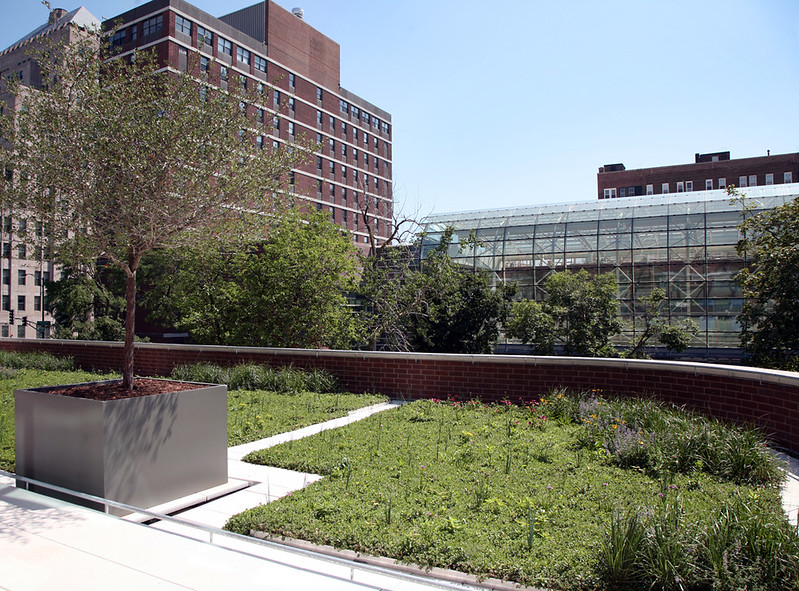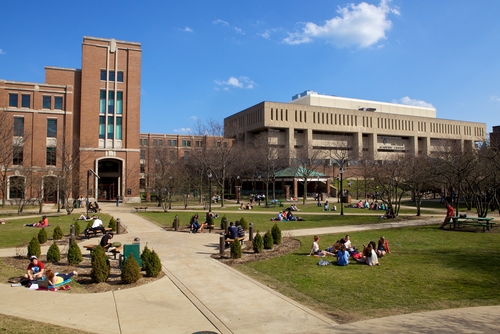Date of ALGECOM-XVII: May 25, 2019
Location: Department of Mathematics at Loyola University Chicago
(Further details will be posted here as they become available)
Local Organizers (questions related to Algecom-XVII):
Peter Tingley
Registration is free. To register, email the local organizer Peter Tingley at ptingley@luc.edu
If you are interested in presenting at the poster session, please e-mail Peter Tingley at ptingley@luc.eduThere may be some NSF support (hotel, airfare/car rental) for graduate students to attend.
Interested students should apply by sending to following information to Peter Tingley at ptingley@luc.edu by March 27, 2019:1. Name:
2. Organization:
3. Will you be attending dinner?
4. Brief summary of research interests:
5. Research advisor:
6: Are you interested in presenting at the poster fair?
7. Approximate expenses:
Funding decisions will be made by ???, 2019.
Housing:
To reserve a room in the dorms:
-Go to https://lodging.luc.edu [lodging.luc.edu]
-Enter the dates you will be staying and the promo code ALGECOM2019.
Information about ALGECOM should show up, and the price should be $76.31,
including tax and things, for a private room with private bath.
Note: if you arrive before May 24 or leave after May 26, this rate will not
show up, and it will be much more expensive. If you need to stay longer,
please contact ptingley@luc.edu and I can probably get the lower rate
extended.
All talks will be in Cuneo Hall 311. (Building 20 on the map above).
Poster session and afternoon tea will be next to Cuneo Hall 311.
The best place to park is the parking structure P1 on the same map. Usually that costs $7, but it is often
free for specially events on the weekend, so we might get lucky
Speakers and schedule: Coffee and pastries 9-10am
1st Talk: Jennifer Morse (U Virginia) 10-11am Title: (Slides) k-Schur Catalan functions
Abstract. We will discuss the what and why of Schur positivity problems and
talk about some Schur positivity conjectures from the 1990's.
We'll then focus on such conjectures concerning particular
polynomials called k-Schur functions. We will
discuss various attempts at these problems over the last decades
and conclude with an overview of our ideas that finally settled
the matter. This is joint work with Blasiak, Pun, and Summers
2nd Talk: Anna Weigandt (U MIchigan) 11:30-12:30 Title: (Slides) Bumpless Pipe Dreams and Alternating Sign Matrices
Abstract: Lam, Lee, and Shimozono introduced bumpless pipe dreams to study
back stable Schubert calculus. In particular, Schubert polynomials can be
expressed as a weighted sum over bumpless pipe dreams in a square grid.
Working from a different perspective, Lascoux gave a formula for
Grothendieck polynomials as a sum over alternating sign matrices. We
explain how alternating sign matrices are in bijection with bumpless pipe
dreams. Restricting to the lowest degree terms of Lascoux's formula
recovers the LLS formula for Schubert polynomials. We show how to use the
pipe dream perspective to compute keys of ASMs. We also discuss how
Lascoux's formula relates to other known expressions for Grothendieck
polynomials in the vexillary case.
3rd Talk: Nate Harman (UChicago) 2-3pm Title: Infinite Rank Superrigidity
Abstract. A theorem of Bass, Milnor, and Serre says that any finite
dimensional representation of SL_n(Z) for n>2 agrees with an algebraic
representation of SL_n(C) along a finite index subgroup. This was
massively generalized by Margulis, and the general phenomenon is now
known as superrigidity. If one tries to extend this to the infinite
rank integral special linear group (i.e. the union of SL_n(Z) for all
n) there is a bit of a problem: this group has no nontrivial finite
dimensional representations and no finite index subgroups.
Nevertheless I will formulate a version of superrigidity for this
group for a natural class of representations arising from the theory
of representation stability.
Poster session and afternoon tea 3-4pm
4th Talk: Hugh Thomas (UQaM) 4:15-5:15pm Title: Reverse plane partitions via quiver representations
Abstract Let $\lambda$ be a partition. The reverse plane partitions of shape
$\lambda$ are a kind of filling of the Ferrers diagram of $\lambda$ by
non-negative integers. Richard Stanley found the generating function which
enumerates them according to the sum of the entries.This series suggests
that reverse plane partitions should be thought of as being built out of
elementary building blocks corresponding to the boxes of $\lambda$. This
then leads to the question of how to divide a reverse plane partition up
into its component pieces. The first way to do this was found by Hillman and
Grassl, thereby giving a bijective proof of Stanley's result. I will present
a simple way to accomplish the same thing which goes via quiver
representations. (The simplicity is due to letting representation theory
take care of the combinatorics for us.) No prior knowledge of quiver
representations will be assumed. This talk is based on joint work with Al
Garver and Becky Patrias, arXiv:1812.08345.
Poster session exhibits:
Colleen Robichaux: (Poster) Complexity, combinatorial positivity, and Newton
polytopes
Tiansi Li: CL-shellable posets with no EL-shellings
Adam Schultze: (Poster) Combinatorial Models for Representations of Affine Lie
Algebras
Aniket Shah: (Poster) Minkowski weights and the Grothendieck group (of a toric
variety)
Sarah Brauner: (Poster) Enumerating Linear Systems on Graphs, Dynkin Diagrams and
BeyondEsther Banaian: Snake graphs from Triangulated OrbifoldsEric Stucky: (Poster) Cyclic Sieving, Necklaces, and Bracelets Gideon Orelowitz: (Poster) Maximizing the Edelman--Greene Statistic
Esther Banaian: (Poster) Snake Graphs from Orbifolds
-----------------------------------------------------------------------------------------------------------------
Parking:
Lodging: we have reserved rooms in the Loyola dorms ($65 per night for a private room with
private bath). Please contact Peter Tingley (tingley@luc.edu) if interested.
|
|






